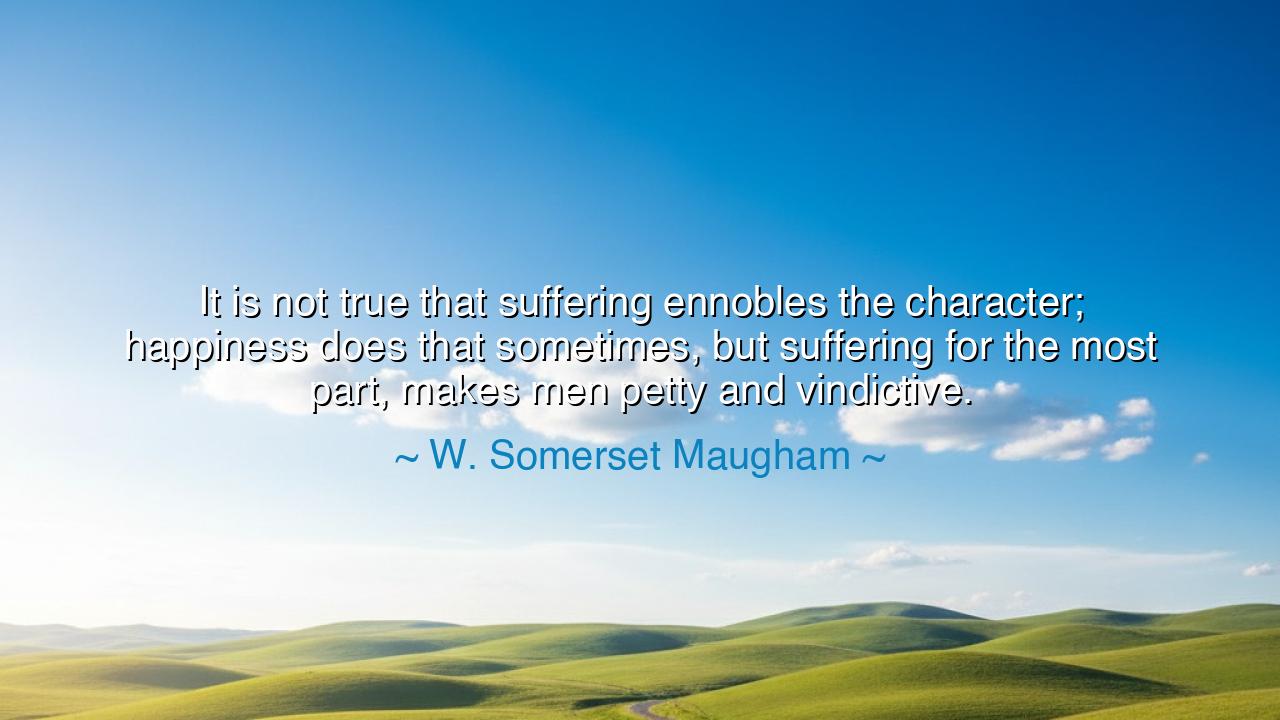
It is not true that suffering ennobles the character; happiness
It is not true that suffering ennobles the character; happiness does that sometimes, but suffering for the most part, makes men petty and vindictive.






The novelist and philosopher W. Somerset Maugham, whose pen carved the truths of the human heart with precision and compassion, once declared: “It is not true that suffering ennobles the character; happiness does that sometimes, but suffering for the most part, makes men petty and vindictive.” These words strike like a lightning bolt against one of humanity’s oldest illusions—that pain alone refines the soul. Maugham, having lived through war, disease, and disillusionment, had seen too deeply into the human condition to be fooled by comforting myths. His truth is sharp, almost merciless, yet profoundly liberating: for it reminds us that suffering does not automatically make us wise, nor kind—it merely reveals what we already are.
The ancients often spoke of suffering as a teacher, a purifying fire that burns away vanity and pride. And in some rare souls, it does. But Maugham warns us that this is not the rule, only the exception. For most, suffering does not polish—it corrodes. It eats away at patience, poisons compassion, and leaves behind bitterness where gentleness once lived. The man who suffers without purpose often seeks to share his misery; the woman who endures without hope may learn not empathy, but resentment. Suffering without understanding, without transformation, becomes a wound that festers rather than heals. Maugham’s wisdom is not cruel—it is honest. He refuses to romanticize pain and demands that we see it for what it often is: a weight that can crush, not crown, the spirit.
This truth was born not from theory, but from Maugham’s own life. A child of loss, he was orphaned early and sent away to a cold, unloving world. As a young man, he served as an ambulance driver in the Great War, witnessing the shattering of youth and idealism. He saw men broken not only in body but in soul—heroes who became cynics, dreamers turned cruel by despair. Later, as a writer and traveler, he observed the same pattern in every corner of the world: the oppressed who, once freed, often became oppressors; the wounded who inflicted their pain upon others. Through it all, he came to understand that suffering alone teaches nothing—it is the mind’s response to it, the meaning we make from it, that can shape or destroy us.
And yet, in contrast, Maugham admits that happiness can ennoble—not the shallow happiness of indulgence, but the deep contentment that arises when the heart is at peace. Happiness opens the soul; it allows generosity, patience, and gratitude to flourish. When one feels secure, loved, and understood, one’s better nature awakens. It is in happiness that man learns forgiveness, in joy that he learns to share. The kind man becomes kinder, the wise man gentler. Happiness, then, is not weakness—it is strength at rest. It takes courage to live joyfully, to keep one’s heart open in a world that glorifies suffering. Maugham’s insight is thus revolutionary: it is not pain, but peace, that refines the human soul.
History, too, bears witness to this truth. Consider Victor Hugo, who lived through exile, loss, and revolution. Though he suffered deeply, it was not the suffering itself that ennobled him, but what he did with it. He transformed his grief into compassion and his outrage into art. But for every Hugo, there are countless others—rulers, generals, and common men—whose suffering turned them cruel, whose pain demanded vengeance rather than mercy. The pages of history are stained not by happiness, but by the bitterness of the wounded, by those who turned their personal agony into the suffering of others. Maugham’s warning is clear: suffering does not sanctify; it must be met with awareness, or it will deform the heart.
What, then, is the lesson for those who live in a world that so often mistakes pain for virtue? It is this: do not seek suffering as proof of strength, and do not glorify it as a badge of worth. When pain comes—as it must—meet it with wisdom, but do not worship it. Let it pass through you, and let it teach you only what is true. But when happiness visits you, even briefly, do not turn it away in guilt or disbelief. Embrace joy as the higher teacher, for it teaches not through wounds, but through abundance; not through scarcity, but through gratitude. Let happiness remind you of the goodness in living, and share that goodness with others.
So, my children of time, remember this: pain is inevitable, but bitterness is not. Suffering will test you, but it will not save you. Only the heart that transforms pain into wisdom, and happiness into generosity, becomes truly noble. Do not envy those who suffer greatly; envy instead those who, in quiet joy, learn to love more deeply, to live more kindly, to walk the earth with grace. For as Maugham knew, the noblest souls are not those scarred by pain, but those illuminated by peace—those who have learned that happiness, when cherished with humility, is not a fleeting gift, but the purest expression of wisdom itself.






AAdministratorAdministrator
Welcome, honored guests. Please leave a comment, we will respond soon